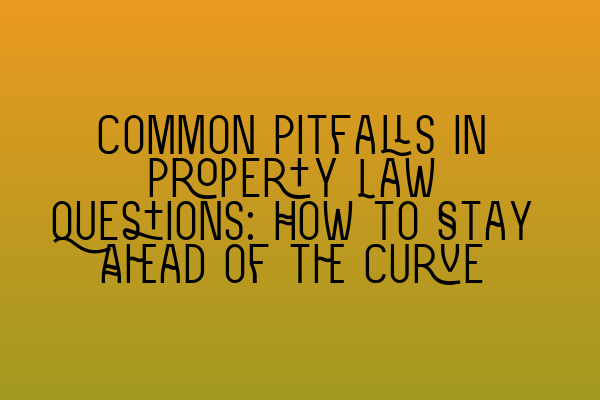Common Pitfalls in Property Law Questions: How to Stay Ahead of the Curve
As a solicitor specializing in property law, it is important to be aware of the common pitfalls that can arise when answering property law questions. Property law is a complex and ever-evolving area of law, and staying ahead of the curve is crucial to providing effective legal advice to your clients. In this blog post, we will explore some of the most common pitfalls in property law questions and provide tips on how to avoid them.
1. Failure to understand the question
One of the biggest mistakes that aspiring solicitors often make is failing to fully understand the question being asked. Property law questions can be complex and multi-faceted, requiring a careful analysis of the facts and relevant legal principles. Take the time to read the question carefully, making note of any specific issues or areas of law that are being tested. By fully understanding the question, you can ensure that you address all the necessary points in your answer.
2. Neglecting to analyze the facts
Another pitfall to avoid is neglecting to analyze the facts of the case. Property law questions often involve a set of factual circumstances that need to be carefully considered and analyzed in relation to the applicable legal principles. Take the time to identify the relevant facts and consider how they relate to the legal issues at hand. This will allow you to provide a well-reasoned and accurate answer to the question.
3. Failing to apply the correct legal principles
Property law is a vast area of law, and it is important to have a solid understanding of the relevant legal principles in order to answer questions accurately. Failing to apply the correct legal principles can result in an incorrect or incomplete answer. Make sure you have a good grasp of the key legal principles and precedents in property law, and apply them to the facts of the case at hand. If you are unsure about a particular legal principle, take the time to research and consult relevant resources.
4. Lack of clarity and structure in your answer
A well-structured and clearly articulated answer is essential in property law questions. It allows the reader to easily follow your reasoning and understand your conclusions. Make sure to start your answer with a clear introduction that outlines the main issues and legal principles involved. Use headings and subheadings to organize your answer and break down complex concepts into smaller, more manageable parts. Finally, conclude your answer by summarizing your main points and providing a clear and concise answer to the question.
5. Failure to consider alternative viewpoints
Property law is often open to interpretation, and different legal authorities may have differing views on certain issues. It is important to consider and address alternative viewpoints in your answer to demonstrate a comprehensive understanding of the law. This shows that you have considered different perspectives and allows you to provide a balanced analysis. Be sure to support your arguments with relevant case law and legal authorities to strengthen your answer.
By avoiding these common pitfalls, you can enhance your chances of success in property law questions and demonstrate your competency as a property law solicitor. Remember to always carefully read and analyze the question, apply the correct legal principles, provide a clear and well-structured answer, and consider alternative viewpoints.
If you are preparing for the SQE exams or looking for resources to enhance your property law knowledge, SQE Property Law & Land Law offers SQE 1 Practice Exam Questions and SQE 1 Practice Mocks FLK1 FLK2 that can help you practice and get familiar with the format and content of the exams. Additionally, SQE 2 Preparation Courses and SQE 1 Preparation Courses are available to help you further prepare for the exams and strengthen your knowledge in property law. Make sure to check the SRA SQE Exam Dates to stay updated on the latest information regarding the exams.
In conclusion, property law questions can be challenging, but with the right approach and understanding of the common pitfalls, you can stay ahead of the curve and provide effective legal advice to your clients. Take the time to carefully analyze the question, apply the correct legal principles, structure your answer effectively, and consider alternative viewpoints. By doing so, you will be well-equipped to tackle property law questions with confidence and success.
